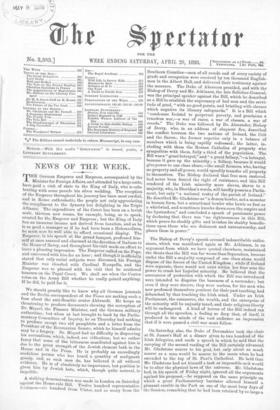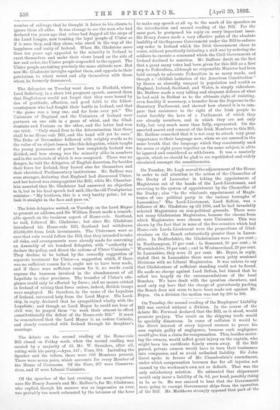On Saturday, also, the Duke of Devonshire took the chair
at St. James's Hall at a dinner given to two hundred of the Irish delegates, and made a speech in which be said that the carrying of the second reading of the Bill certainly advanced Mr. Gladstone nearer to his goal, but only about as much nearer as a man would be nearer to the moon when he had ascended to the top of St. Paul's Cathedral. He held that Mr. Gladstone had set himself a task as impossible as it would be to alter the physical laws of the universe. Mr. Gladstone had, in his speech of Friday night, ignored all the arguments against his proposal,—he supposed on the same principle on which a great Parliamentary barrister allowed himself a pleasant ramble in the Park on one of the most busy days of the Session, remarking that he had been retained by so large a number of railways that he thought it fairer to his clients to ignore them all alike. It was strange to see the man who had declared ten years ago that crime had dogged all the steps of the Land League, now treating the loyal people of Ulster as if it were they, and they alone, who stood in the way of the happiness and unity of Ireland. When Mr. Gladstone more than ten years ago appealed to the minority in Ireland to exert themselves and make their views beard on the side of law and order, the Ulster people responded to the appeal. The Ulster people are taking precisely the same attitude now. But now Mr. Gladstone inveighs against them, and appeals to their patriotism to wheel round and ally themselves with those whom he formerly denounced.



















































 Previous page
Previous page